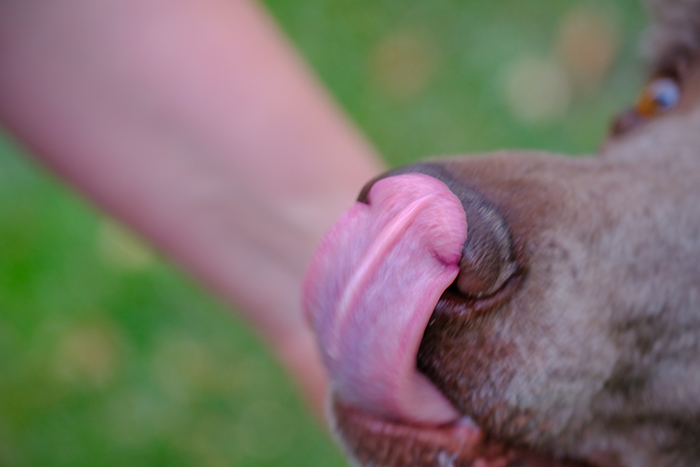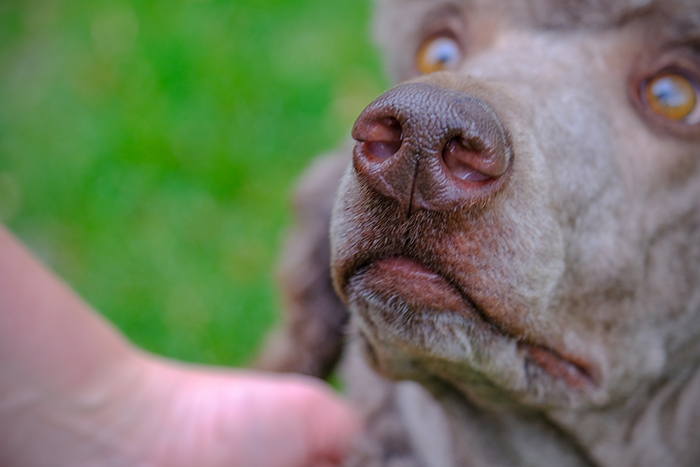Medical Alert
Greatdogs smell chemical changes in the human body, such as cortisol and blood glucose levels and indicate those changes to you, the handler. This ability allows them to act as a barometer, providing real-time information about the ever-occurring changes in your body, giving you time to make any needed adjustments. A Greatdog by your side can have a positive life-changing effect by increasing confidence, allowing for a higher quality of life.
Creasy alerts to dropping blood sugar
definitions
phil·trum
/ˈfiltrəm/
noun
The philtrum in dogs helps to channel and direct fluids from the mouth toward the nose, which is essential for their sense of smell. The size and shape of the philtrum can vary among dog breeds, and some breeds may have a more pronounced philtrum than others.
bi·o·chem·i·cal de·tec·tion
/ˈˌbīōˈkeməkəl /dəˈtekSH(ə)n/
adjective / noun
Biochemical relates to chemical processes, or reactions that occur inside the human body.
Your body is a mecca of biochemical changes. For example, the way your body converts food into energy is a biochemical reaction, as is the way your body fights disease and responds to stress and environmental stimuli.
Medical Alert Service Dogs are trained to use scent, paired with an innate ability to recognize subtle fluctuations that occur within your body, and alert their handler to these changes in real-time – valuable information that allows the handler to take necessary precautions and make adjustments to ensure an enhanced quality of life.
Amazing, huh?
To a trained Medical Alert Service Dog, your body has a biochemical fingerprint that is unique to you. I call this the “SCENT PRINT!”
Three places your scent print lives….
Under your
fingernails, your breath, and even sweat
contains valuable information for which a fully trained medical alert service dog draws his intel. In fact, his sense of smell is 100,000 times more powerful than ours.
Fun Fact
Fingerprints are formed at the same time as the brain’s neocortex – which controls emotions, cognitive ability such as concentration, memorization and the ability to manage problems.

How does he know that?
For dogs, biochemical changes are inherent to their understanding of another living being’s health and status.
Mother dogs release oxytocin – a calming hormone to sooth their young; resulting in a stronger social bond.
An animal which is ill, on the other hand, releases a cocktail of biochemicals ranging from cortisol (stress hormones), to adrenaline and acetone (which is key in blood glucose levels) as well as hypochlorous acid (the scent produced when white blood cells are attacking infection).
The skill to recognize subtle shifts in biochemicals is first inherited as a defense mechanism, many dogs are equipped with a basic understanding of what these changes mean – “something is off balance” – a select few progress to taking the initiative of doing “something” about it. Those are the dogs I select for in my program.
A Natural Response to Biochemical Changes
Licking His Lips
A universal calming signal, dogs lick their lips because there is something going on around them that they perceive as a threat. The deliberate moment a dog licks his lips sends a distinct internal message – this dog is worried. Externally, dogs lick their lips in an effort to appease and soothe a person or animal.
The Nose Knows
Longer muzzled dogs, like Standard Poodles and Rough Collies have a physical advantage over others. Scent held in the valley of the philtrum has a lengthy journey to the olfactory lobe, the scent processing center of the brain – which is some 40 times larger than that of a human’s! The added time for which the scent resides in the pathway to the olfactory, allows more time to process the scent print, as well as enabling the dog to process scent from further away.
The Philtrum
Have you ever noticed that tiny valley, from a dog’s lips right up the middle of his cold wet nose? That’s the philtrum! This tiny crevasse is instrumental in collecting and preserving the scent print! You see, moisture is a vehicle for scent – like an UBER for Biochemicals. Whenever a dog licks his lips, moisture collects in the valley of the philtrum, locking-in the scent for a closer and longer SNifFfff!
Consider this, pair the function of the philtrum, with the physiological nature of lip-licking and you have the perfect combination of ingredients for a medical alert service dog in the making… Even so, developing a fully trained service dog takes hundreds of hours of preparation, specialized training and skill.
Emotions are nothing more than a series of chemical changes”
– Mentor Dr. Dino Signore, Edward Lowe Foundation






